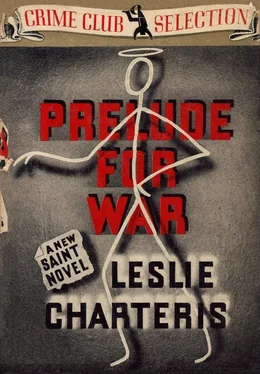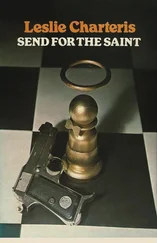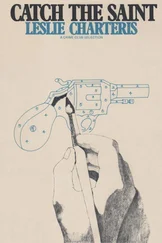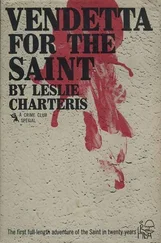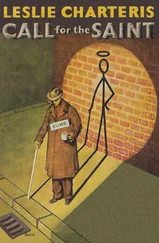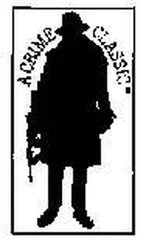Before Simon could answer the coroner intervened.
"Mr Templar's past life.and any nickname by which he may be known to the public are not subjects which we have to consider at this inquiry. Kindly confine your questions to facts relevant to the case."
There was an awkward pause. The little juryman's attitude was still undaunted, but he didn't seem to know what to say next. He looked about him desperately, as if searching the room for inspiration. Finally he spoke.
"Do you think there was something fishy about this fire?" he demanded.
"Mr Templar's personal opinions are not matters which concern this court," interrupted the coroner sternly.
The Saint smiled. He looked at the little juryman, and spoke very clearly and distinctly.
"Yes," he said. "I think there were a lot of very fishy things about it."
There was a moment of silence so heavy that it seemed almost solid. And then it broke in a babble of twittering speculation that surged over the room as if a swarm of bees had been turned loose. There was a craning of necks all over the court, a quick rustling of notebooks among the reporters.
Simon stood at his ease, absorbing the pleasant radiations of the sensation he had created. Well, he reflected, he had certainly done it now. He glanced at the rows of seats where the party from Whiteways was sitting. Luker's expression had not changed: he wore his usual cold stony mask. Fairweather looked acutely unhappy: he could not meet the Saint's gaze. The General and Lady Sangore had adopted an indignant pose of having nothing to do with what was going on: they sat as if red-hot pokers had been inserted into their backs and they were pretending not to notice it.
Simon's glance travelled on and found the faces of Peter and Patricia among the scatter of pink blobs that were turned up to him. He held their eyes for a moment with a message of impenitent devilry.
The jury were goggling at him openmouthed, with the sole exception of the small black-bearded man, who had taken up a Napoleonic posture with his arms proudly folded and a radiance of anarchistic joy on his face. The coroner had gone slightly purple; he banged on the table in front of him.
"Silence!" he shouted. "Silence, or I'll have the court cleared!"
He turned angrily on Simon.
"We are not interested in your theories, Mr Templar, and you had no right to make such a statement. You will please remember that this is a court of law."
"I'm trying to," said the Saint unflinchingly. "I thought I was summoned here to give evidence. I haven't had the chance to give any yet. I'm not offering theories. I'm trying to draw attention to one or two very curious and even fishy facts which I have not been allowed to mention."
"What are they?" chirped the little juryman exultantly, before the coroner could speak again.
"For instance," said the Saint, "there is the fact which I noticed, which the lady who was with me noticed, and which even the police who were on the scene must have noticed, that every ground-floor window in sight was open, producing a draught which must have materially helped the growth of the fire."
Fairweather stood up.
"I could have explained that if it had been brought up before," he said. "It is true that most of the windows were probably open. It was a warm evening, and they had been open all day. It has always been the butler's duty to lock up the house before he retires, and it had completely escaped my attention that he was not there to do it that night when we went to bed. He would, of course, have locked up as soon as he came in; but unfortunately the fire started before that."
"Thank you, Mr Fairweather."
The coroner shifted the papers on his desk again with two or three aimless, jerky movements, as if to gain time to re-establish his domination. Then he leaned back again and put his finger tips together and went on in a more trenchant voice.
"This is a regrettable but instructive example of the danger of jumping to rash conclusions. It is one very good reason why the personal opinions of witnesses are not admissible in evidence. There are some people whose warped minds are prone to place a malicious interpretation on anything of which the true explanation is beyond their limited intelligence. There are also persons whose desire for cheap notoriety leads them to distort and exaggerate without restraint when they find themselves temporarily in the public eye, in the hope of attracting more attention to themselves. It is the duty of a court to protect the reputations of other witnesses, and the open-mindedness of the jury, from the harm which may be done by such irresponsible insinuations. In this case, an insignificant fact which is not contested has been brought up with much ado. But so far from supporting the suggestion that there is something 'fishy' involved, to any normal and intelligent person it merely confirms the chain of mischances through which the deceased lost his life."
"All right," said the Saint, through his teeth. "Then why was Kennet's door locked?"
The coroner lost his head for a moment.
"How do you know it was locked?"
"Because I saw it. I got as far as his room, and I could have got him out if I could have got in. But it was locked, and it was too strong to break down. I went back to get an axe, but the floor of the corridor caved in before I could get back."
"Well, supposing his door was locked — what of it?" demanded the coroner in an exasperated voice. "Why shouldn't he lock his door?"
Simon spoke very gently and evenly.
"I imagine he had every reason for locking it," he replied. "When a man goes to stay in a house full of his bitterest enemies, people whom he's fighting with all the resources at his command, people to whom wholesale slaughter is merely a matter of business, he's a fool if he doesn't lock his door. But it hasn't been proved that he did lock it. I simply said that his door was locked; and I might add that the key was not in it."
"Beg pardon, sir." The captain of the fire brigade stood up at the far end of the room. "I found a door key among the daybree in the libry."
There was a hushed pause.
"Exactly," said the coroner, with sarcastic emphasis. "Kennet locked his door and took out the key. I fail to see any sinister implications in that — in fact, I have frequently done it myself."
"And have you frequently held inquests without bringing any evidence to establish the cause of death?" retorted the Saint recklessly.
For an instant he thought that even he had gone too far. When he thought about it afterwards, in cold blood, the consequences that he had invited with it brought him out in a dank sweat. But at that moment he was too furious to care.
The coroner had gone white around the nostrils.
"Mr Templar, you will withdraw that remark at once."
"I apologize," said the Saint immediately. It was the only thing to do. "Of course I withdraw it."
"I have seen the body myself," said the coroner tightly. "And in a straightforward case like this, where there is absolutely no evidence to justify a suspicion of foul play, it is not thought necessary to add to the suffering of the relatives of the deceased by ordering an autopsy."
He moved his hands over his blotter, looking down at them; and then he brought his eyes back to the Saint with grim decisiveness.
"I do not wish to repeat my previous remarks. But I cannot too strongly express the grave view which I take of such wild and unfounded accusations as you have made. I have only refrained from committing you for contempt of court because I prefer not to give you the publicity which you are doubtless seeking. But you had better go back to your seat at once, before I change my mind."
Simon hesitated. Every instinct he had revolted against obedience. But he knew that there was nothing else he could do. He was as helpless as a fly caught in the meshes of a remorseless machine.
Читать дальше
